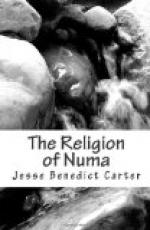The most vital question which can be put to almost any religion is that in regard to its expansive power and its adaptability to new conditions. Society is bound to undergo changes, and a young social organism, if normal, is continually growing new cells. New conditions are arising and new interests are coming to the front. In addition, if the growth is to be continuous, new material is being constantly absorbed, and the simple homogeneous character of the old society is being entirely changed by the influx of foreign elements. This is what occurred in ancient Rome, and it is because ancient Roman religion was not capable of organic development from within, that the curious things happened to it which our history has to record. It is these strange external accretions which lend the chief interest to the story, while at the same time they conceal the original form so fully as to render the writing of a history of Roman religion extremely difficult.
Yet it must not be supposed because Roman religion was unable to adapt itself to the new constitution of society with its contrasted classes, and to the new commercial and political interests which attracted the attention of the upper classes, that it was absolutely devoid within itself, within its own limitations, of a certain capability of development. For several centuries after outside influences began to affect Rome, her original religion kept on developing alongside of the new forms. The manner in which it developed is thoroughly significant of the original national character of the Romans.
We have seen that from the very beginning the nature of the gods as powers rather than personalities tended to emphasise the value and importance of the name, which usually indicated the particular function or speciality of each deity and was very often the only thing known about him. In the course of time as the original name of the deity began to be thought of entirely as a proper name without any meaning, rather than as a common noun explaining the nature of the god to which it was attached, it became necessary to add to the original name some adjective which would adequately describe the god and do the work which the name by itself had originally done. And as the nature of the various deities grew more complicated along with the increasing complications of daily life, new adjectives were added, each one expressing some




